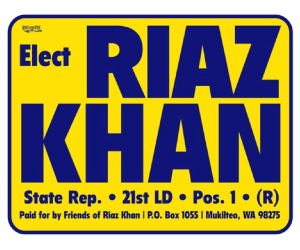By Erin Freeman | Lynnwood Times Staff
An initiative that would have reduced car tab fees to $30 has been ruled unconstitutional by the Washington Supreme Court for containing too many subjects and a misleading description on the ballot.
The state Supreme Court struck down initiative measure number 976 (I-976) on Thursday, October 15, ruling it as invalid due to violation of the state’s single-subject rule and determining it held an inaccurate ballot title. The decision was nearly unanimous, nine judges ruling the initiative contained more than one subject, while eight of them also ruled the initiative’s subject was not accurately expressed within its title.
I-976, sponsored by Tim Eyman, was passed statewide by voters last November, passing by 58% in Snohomish County. It would have capped most taxes paid through annual vehicle registration at $30 while revoking state and local authority to add new taxes and fees. Yet, it was unable to take effect after being temporarily blocked by a judge. The state Supreme court upheld the decision to block it until the final ruling was made.
“I-976 is the latest in a series of initiatives about recusing or eliminating local motor vehicle excise taxes, including taxes that have been pledged to support major transportation projects throughout the state,” explained the final decision.
Eyman issued a statement in response to the ruling, upholding that voters were not confused about the initiative, calling it “maddening” that the supreme court ruled it so.
“Voters passed into law an initiative making certain vehicle taxes and fees illegal and yet we’re being told to pay those taxes and fees anyway because ‘voters were confused’,” said Eyman in an October 15 statement. “We were not.”
“The people are on our side: they demand $30 tabs. And they’re spittin’ mad,” said Eyman in another statement, issued on October 16 via social media.
The state Office of Financial Management estimates the impact of I-976 would have cut more than $4 billion in tax revenue by 2025, threatening transportation mobility and service projects throughout the state.
Sixty-one Washington cities currently use car tab fees to fund road construction, bus service, and sidewalks. Additional fees are charged by the state to support programs including Washington State Patrol traffic enforcement, highway maintenance, ferry operations, and maintenance of county roads and bridges. Over the next 10 years, these cities could have expected to lose about $60 million in their Transportation Benefit Districts, according to NO976- a coalition opposing I-976.
In Lynnwood, with car tab fees making up approximately one-third of its Transportation Benefit District, the city estimates it would have experienced a $1.2 million annual drop in its transportation infrastructure program with the initiative. This revenue supports the funding of preventative and routine pavement maintenance and reconstruction, street, and traffic maintenance and operations, and other capital projects in the City’s Transportation Plan says the city of Lynnwood spokesperson Julie Moore.
“These funds help maintain and improve the critical infrastructure of our city which in turn improves the quality of life for our community members,” said Moore.
In the city of Everett, the onset of I-976 would have dealt a major blow to already strained revenue streams and would have eliminated most of the fees and taxes for car tabs, including the funding for Sound Transit,” said city of Everett Mayor Cassie Franklin.
“This would result in the loss of millions per year in funds we use to keep our roads safe and well-maintained, as well as support for our paratransit services,” said Franklin. “We appreciate this ruling and will evaluate what it means for our city.”
While Sound Transit was not party to this litigation, the transit agency is pleased with the decision, said Patrick Geoff, a spokesperson for Sound Transit.
I-976 was not anticipated to have had any immediate impact on Sound Transit, continued Geoff, as the initiative allowed, and state law requires, Sound Transit to continue collecting its current voter-approved Motor Vehicle Excise Tax (MVET) and its Rental Car Tax until all bond and other debts secured by the taxes are repaid, currently projected for 2028.
Yet, I-976 sought to have Sound Transit accelerate the repayment of bonds and other debts, at which point the Sound Transit MVET could be reduced or eliminated, forcing it to collect additional taxes and divert revenues from transit project to pay the cost of bond defeasance, refinancing or retirement, explained Geoff. The acceleration would eliminate a projected $7.2 billion in MVET and Rental Car Tax revenue, which would require cutting or significantly delaying projects across the region. Future litigation might have been required to determine the constitutionality of the provisions related to Sound Transit, said Geoff.
“The confirmation of the unconstitutionality of the initiative will enable Sound Transit’s continuation of transit services and transportation investments that are vital to residents and businesses across the state of Washington,” said Geoff. “The decision also avoids potential litigation about the status of critical Sound Transit expansions that were decisively approved by the region’s voters.”



















